On a warm January day, Mlango Farm greets us with rows of neatly arranged vegetable plants stretching toward the sky. Hearty corn stalks and shining sheaths of wheat are at the center of the fields, where the employees are carefully harvesting goods to sell tomorrow. The ground is dry and warm, and cracks beneath our feet in the midday sun.
Els Breet and farmworker Anton lead us to a carefully sectioned-off plot at the edge of Mlango Farm. Beaming, they gesture to several rows of bright green plants labelled ”no fungicide". The plants are freshly watered, and droplets cling to the healthy leaves. The thriving plants and Els’ expression are a drastic turnaround from a conversation we had just a few months ago.
We met farmer Kamande and his wife Els in Limuru, Kenya during one of our visits to local farmers. When we first met, they had almost given up the thought of adding potatoes to their customer’s fresh vegetable portfolio. Why? The answer was simple: “They always die.” After these disappointing experiences growing regular potatoes, she had given up hope to find a variety that would actually be resistant to late blight and give a plentiful yield.
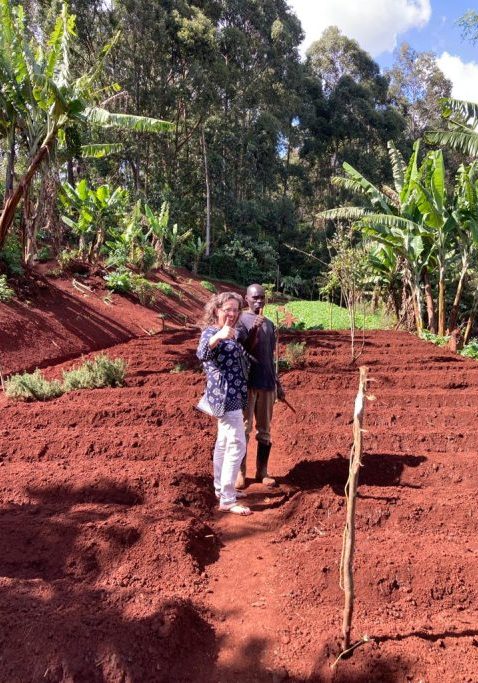
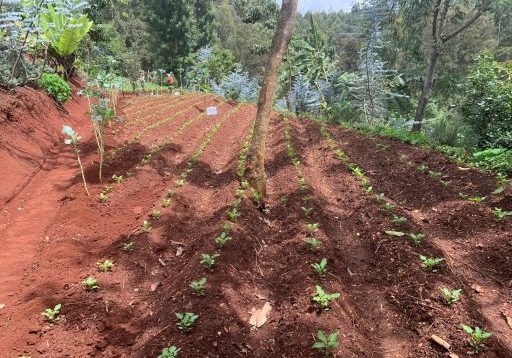
At our first meeting, Kamande pulled up photos on his phone of sickly potatoes and shriveled leaves. Despite some skepticism at first, we asked them to try again - this time with technology on their side. Mlango Farm is one of the first farms to trial the new variety with late blight resistances that was developed at Solynta in the Netherlands. We promised that we would support them with agronomic support, and they quickly agreed; potatoes would make a very nice supplement to their product offering.
We delivered Mlango Farm home-grown plantlets from true seed, produced at our trial facility in Limuru and supported them and their staff while they planted them in the field. No fungicides were used, just water.
That was three months ago. Today, their potato crop is thriving - thanks to the power of disease-resistant, pest-fighting, hardy hybrid-bred seeds.
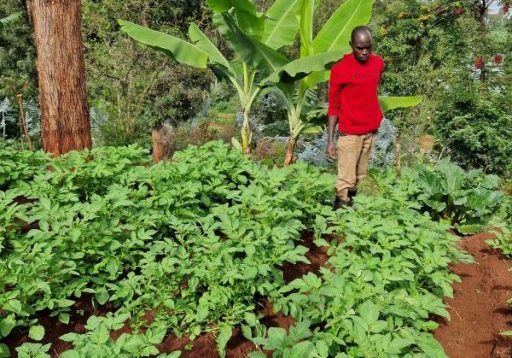
Planting organic Solynta seedlings
Mlango Farm is one of approximately 4.5 million farmers in Kenya, a country where agriculture accounts for one-third of the GDP (UN FAO). Seventy percent of the rural population works on a farm, growing mainly maize, wheat, beans, and, of course, potatoes (International Trade Association). An estimated 2.5 million people in Kenya are employed in the potato value chain (Farmbiz Africa).
But for organic farmers like Kamande, potato farming had fallen out of favor, as the use of agronomic chemicals do not fit his business at all. Without these chemicals, late blight infection is always lurking and can be devastating to production. Farmers have every right to be concerned about late blight – it’s the same disease that caused the Irish potato famine, which cost the lives of an estimated million people in 1845. Since then, breeding resistant varieties has been one of the top priorities of potato breeders, but with no/little success. Until now.
Resistance from Late Blight is essential
Late blight can travel via water with the seed tubers that are used to grow new potatoes. The fungus disease spreads rapidly and has devastating effects to both plant and potato. One infected seed tuber can contaminate thousands of others through its airborne spores, water runoff, and affected soil. Farmers can use pesticides to treat the disease, but these chemicals pollute local soil and groundwater, and new government regulations often curb pesticide use. Farmers are left to handle the crisis themselves - and many of them stopped growing potatoes for this reason.
With the new hybrid varieties produced from Solynta’s true seeds, potatoes need less agricultural chemicals to thrive and can withstand the biggest potato pest of all better! Hybrid breeding is a non-GMO form of targeted breeding. Scientists can breed for carefully selected traits like shape, color, taste, and, importantly, disease and pest tolerance. We’ve been leading the quest for successful hybrid breeding in potatoes since 2006, and with farmers like Kamande, we’re seeing our impact in action. We grew plantlets that were planted at Mlango Farm from our latest hybrid true potato seeds. Our researchers bred the variety specifically to suit the Kenyan climate zone, adjusting for soil pH, drought conditions and enhanced resistance against late blight.
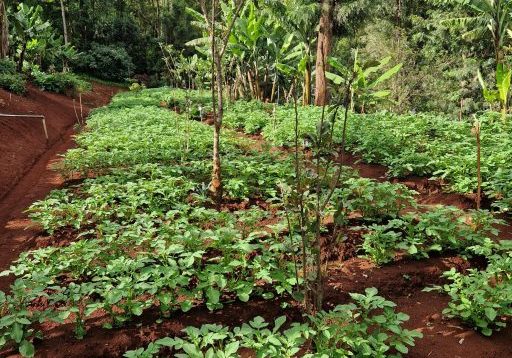
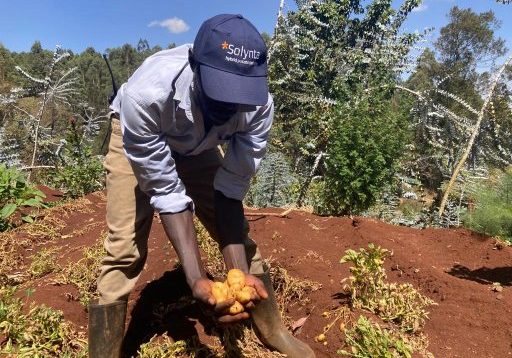
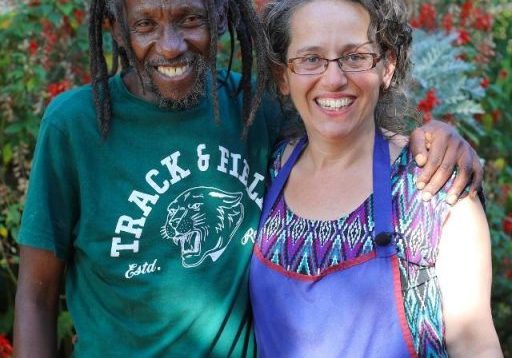
Harvesting nutritious, delicious organic potatoes
It's three months later, and we have returned to Mlango Farm to see how the potatoes are doing in the field. We’re just in time for the harvest of the potatoes, as the biggest proof of Solynta’s hybrid potato success is in the potato yield.
For the first time, the farm workers managed to produce healthy and great looking potatoes on Mlango Farm’s potato plot. And they are overjoyed!
For organic smallholder farmers like Kamande and Els, a successful new crop is a lucrative business opportunity, as they can improve their yield and product portfolio. They can bring Solynta potatoes to market and sell them to local families, who will be pleased to have these included in their fresh vegetable offering. Without the use of any pesticides. This gives happy customers, and a leg up over the competition too.
While growing his business is a win for Kamande, the real benefits come from the added security hybrid potatoes bring. With a predictable, reliable output, Solynta’s hybrid breeding can deliver new varieties adjusted to soil changes or emergent diseases. Kamande is excited to grow more organic late-blight resistant potatoes on the farm and even more excited to offer his customers these new, tasty and nutritious potatoes. We are confident that many more farmers in Kenya will follow this example.
After the writing of this article, Kamande Njenga, founder of Mlango Farm, passed away on 7 May 2023. His wife Els and all Mlango Farm staff are committed to make his legacy grow.

